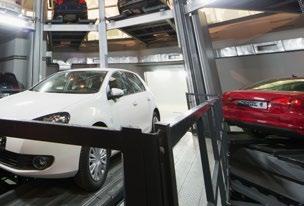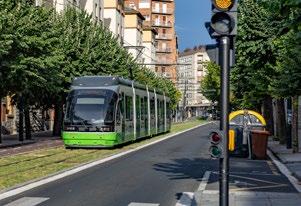

Our Expertise
What do we do?
We provide transport planning expertise to unlock the full potential of our client's sites.

We help our clients achieve planning permission for a wide range of developments; from converting a twostorey house into two luxury apartments to a 10,000home garden village, regenerating a town centre, building a new business park and everything in between.
How do we do it?
We provide innovative solutions, collaborating with project teams to provide transport and movement strategies which create attractive places for people to live and work.

We pride ourselves on communicating and presenting information clearly and logically throughout our work to ensure key messages are understood.
Why choose Iceni Transport?

We value providing a high-quality service and forging strong professional relationships with clients, consultants and local authorities to add as much value to development proposals as possible. We believe these qualities are the key to delivering the best commercial results for our clients
We monitor and keep up with the latest industry trends to produce transport and movement strategies which are agile and flexible to meet the needs of future technologies.


Transport
Vision & Written Representations
Active Travel & Connectivity Studies

Innovative
Parking Solutions
Construction
Management Plans
Traffic Impact
Modelling
Transport Assessments & Travel Plans





Place & Mobility Design



Expert Witness

Delivery & Servicing
Management Plans
Site Appraisal & Stage 1

Technical Design

The Team








 Fred peters Director | London
Clive Burbridge Director | London
Mike England Director | London
Richard Jay Principal Transport Planner | London
Archie Keenan Technician | London
Kelly Davis Principal Transport Planner | London
Matt Bacon Engineer | London
Aidan Pearce Senior Technician | London
Mitchell Gregory Senior Engineer | London
Fred peters Director | London
Clive Burbridge Director | London
Mike England Director | London
Richard Jay Principal Transport Planner | London
Archie Keenan Technician | London
Kelly Davis Principal Transport Planner | London
Matt Bacon Engineer | London
Aidan Pearce Senior Technician | London
Mitchell Gregory Senior Engineer | London





 Rob Amey Director | London
Lee Talbot Principal Engineer | London
Simon Possee Associate Director | London
Nathan Micallef Engineer | London
Matt Bolshaw Senior Transport Planner | London
Rob Amey Director | London
Lee Talbot Principal Engineer | London
Simon Possee Associate Director | London
Nathan Micallef Engineer | London
Matt Bolshaw Senior Transport Planner | London
Evolution of Transport Planning

Predict and Provide
Predict what may be required in the future, and then implement measures for that. Results in:

Active Travel | Hierarchy of Movement


Active Travel England
Who is responsible for Active Travel?

ENGLAND (excluding London)
Active Travel England
LONDON
TfL / Local Boroughs
SCOTLAND
Scottish Government
WALES
Welsh Government
NORTHERN IRELAND
NI Department for Infrastructure

Local Authority Capability Ratings in Active Travel , 2022

Rating 0
Local leadership for active travel is not obvious, no significant plans are in place, the authority has delivered only lower complexity schemes.
Rating 1
Some local leadership with basic plans and isolated interventions that do not yet obviously form a plan for a network.
Rating 2
Strong local leadership, with clear plans that form the basis of an emerging network with a few elements already in place.
Rating 3
Very strong local leadership, comprehensie plans, and a significant network in place with a growing number of people choosing to walk, wheel and cycle.
Rating 4
Established culture of active travel with successive increases in walking, wheeling and cycling, underpinned by a dense integrated network and highly supportive policies to give more people the choice to walk or cycle.

Active Travel England

Announced by Department for Transport in January 2022.
Responsible for walking, wheeling and cycling policy, managing the active travel budget, and inspecting funded schemes on completion.
Tasked with delivering the Government’s objective of ensuring 50% of trips in England’s towns and cities are walked, wheeled or cycled by 2030.
They also assist local & highway authorities with performance on active travel and good practice in design, implementation and public engagement.
Most pertinently, they will become a statutory consultee on the following applications from June 2023:
Over 150 dwellings
7,500m2 commercial area, or
Over 5 hectares total.

Accessibility & Connectivity
With the introduction of Active Travel England on the horizon and the ongoing policy position in London both encouraging active travel, Iceni are promoting the idea of a Connectivity Study to help demonstrate the benefits of developments.

Accessibility for all modes and all users is becoming a key consideration in the planning process and the study can be used to help highlight the options available.
The analysis we undertaken can be used to highlight existing gaps in infrastructure, or help promote sites for future development by highlighting potential opportunities for new links.

Whichever way the study is used it can provide benefits to future communities by encouraging healthier ways of living, creating a more active street scene, and increasing the sense of place and community.
The focus of the Connectivity Study is to ensure that active travel is made a priority, and feasible mode for all. This means suitable routes for those with a disability, suitable routes for use in the dark and suitable routes for inclement weather.
Travel patterns are most likely influenced from the outset, so doing the hard work now and providing the infrastructure from the beginning gives the development the best chance in succeeding to provide healthy and active communities.
This process also links well with work carried out by Local Authorities and could be used to help support the process of producing Local Cycle and Walking Infrastructure Plans (LCWIP) to help authorities understand where there are shortfalls across their jurisdiction. In turn this could lead to a better rating with ATE and therefore enable them to access better funding.
Examples of previous connectivity studies carried out by Iceni include Bromley by Bow in East London and Minster in Kent, which have highlighted the active travel opportunities available for forthcoming developments.
The route from the middle of the Site to the Tesco be equivalent to a circa 11-minute walk for the typical cycle ride (albeit having to dismount for the ramp
17. To continue towards C2 / Stratford, two options are at Three Mill Lane and follow a towpath that runs the way to High Street (A118), which the CS3 runs can cross the A12 via a subway to access St Leonard’s Franklin Street. Heading north from here, you could follow that round to join onto C2, which you would or continue north up to Bow Roundabout where head west towards Stratford These routes are shown
Figure 7 – Routes to the north of the Site
Potential Improvements
18. Whilst the above section has demonstrated that destinations available to the north of the Site, it is that can be made with regard to the connectivity
19. These potential improvements focus on the initial itself, and a summary of what could be done is provided that whilst the existing route to the Leaway is suitable, Bow Creek to connect into the northern section of provided, rather than having to head south first to for there to be a dedicated foot / cycleway running would then provide access to a bridge over to the
20. Two locations for where this new bridge link could noted that only one of these is considered to be
Thanet Viking Existing Potential Potential Site

which access to the Tesco food store is provided. Tesco access is approximately 900m, which would typical pedestrian, or alternatively a circa 4-minute ramp down to the Leaway)
are then available. You can either continue north runs adjacent to the Three Mills Wall River Weir all runs along. Or alternatively, cyclists / pedestrians Leonard’s Close via either Washington Close of could either turn left onto Bromley High Street and would probably do if heading towards Central London, you can also join C2 in either direction i.e. also shown in Figure 7
to
existing route, three new/diverted cycle routes have been explored, as indicated shown at Figure
2.4 – Viking Coastal Trail Route Diversion & Cycle Path Opportunities
Provide New Toucan Crossing
that existing routes are available to the likely key is considered that there are some improvements of the Site to these routes.


Upgrade existing crossing to Toucan Crossing
the upgrade and conversion of have previously carried / , although it is understood this is now , if the bridge could be converted for walking and cycling it would provide a better alternative to Twelvetrees Crescent Bridge and would connect shows the existing bridge landing,


Potentially provide New Toucan Crossing
Site
initial connectivity between the Site and the Leaway provided in suitable, by providing a foot / cycle bridge over the of the Leaway a much more direct route to then head north. As such, it is initially proposed running along the western boundary of the Site, which the Leaway could go are shown required to improve the connectivity sufficiently.
Minster
Cliffsend
hanet Parkway
Viking Coastal Route
Existing Cycle Routes



Potential Diverted Viking Coastal Trial
Potential Additional Cycle Route
Cycle paths
Benefits of the Site to Viking Coastal Trail
benefit of the Site in relation to the Viking Coastal Trail is the opportunity to provide onward
The Sustainable Development Scorecard

The National Planning Policy Framework (NPPF) has running throughout it the ‘golden thread of sustainable development’. In spite of this, there is no clear-cut, NPPF-based assessment criteria to consider a site or project’s sustainable development credentials, making current assessment processes both tricky and subjective.
The Sustainable Development Commission was established to address this recognised issue with our planning system. Made up of a balanced cross-section of industry professionals, the Commission has debated the issues and found solutions, culminating in the creation of the Sustainable Development Scorecard.
The Scorecard website is free to use and accessible to anyone with a vested interest in development, including developers, architects, planners, community groups and members of the public. By crystallising the NPPF’s guidance into a simple, online analysis tool, the Commission aims to provide a more consistent approach to sustainable development, leading to a more sustainable built environment.
www.thescorecard.org.uk
Birmingham: The Colmore Building, 20 Colmore Circus Queensway, Birmingham B4 6AT
Edinburgh: 7 Alva Street, Edinburgh, EH2 4PH
Glasgow: 177 West George Street, Glasgow, G2 2LB
London: Da Vinci House, 44 Saffron Hill, London, EC1N 8FH
Manchester: WeWork, Dalton Place, 29 John Dalton Street, Manchester, M2 6FW www.iceniprojects.com
